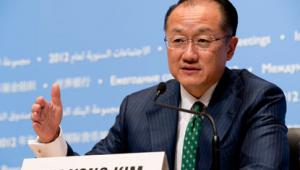By Nick Mann | 22 April 2013
Managing public spending in a ‘stronger, more strategic way’ could help developing countries to end extreme poverty and achieve inclusive growth, according to World Bank president Jim Yong Kim.
Speaking during the World Bank/International Monetary Fund spring meetings in Washington yesterday, Kim said ‘enormous gains’ could be made by improving fiscal policy.
‘We have ample research showing that well-managed spending on public goods such as infrastructure, public education and health has a positive impact on growth,’ he said.
In particular, resource-rich developing countries can use properly managed revenues from their commodities to ‘dramatically accelerate poverty reduction and the building of shared prosperity’, he explained.
Kim contrasted this with ‘mismanaged’ resource wealth, which he could lead to corruption and conflict, as well as reducing the competitiveness of a country’s economy. ‘This vicious cycle, known commonly as the “resource curse”, often contributes to prolonged economic stagnation and rising poverty,’ he noted.
He also highlighted the benefits of conditional cash transfer programmes, which make payments available to poor families when they meet certain criteria. In particular, he noted the ‘vital support’ provided by the Bolsa Familia initiative in Brazil, where poor households receive monthly cash payments if their children are enrolled in school.
‘In Brazil, for example, there is very high inequality in market incomes, but the fiscal system reduces income inequality significantly through conditional cash transfer programs, like Bolsa Familia,’ Kim explained.
‘We are learning from such experiences so we can share them with other countries,’ he added.
The potential for popular opposition to changes in how government money is spent means ‘creative communications campaigns’ are needed to clearly explain the benefits of policy change to communities, Kim said.
This was particular the case with fossil fuel subsidies. ‘We know that these subsidies are threatening fiscal sustainability in many countries, that they are regressive, and that they are bad for the environment,’ he said.
‘And yet the political economy of removing fuel subsidies remains complicated. We need to analyse these dynamics and find pragmatic solutions.’













